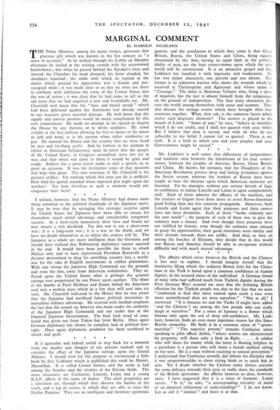MARGINAL COMMENT
By HAROLD NICOLSON
THE Prime Minister, among his many virtues, possesses that gracious gift which was known in the last century as " a sense of occasion." As he walked through the Lobby on Monday afternoon he smiled at the waiting crowds with his accustomed benevolence ; but when he passed behind the Speaker's chair and entered the Chamber his head drooped, his brow clouded, his shoulders hunched ; the smile with which he replied to the cheers which greeted his appearance was a distant and pre- occupied smile ; it was made clear to us that we were not there to celebrate with jubilation the entry of the United States into the war of action ; it was clear that he had come to tell us the sad news that we had acquired a new and formidable foe. Mr. Churchill well knew that the " base and brutal attack " which had been delivered against the Americans had already caused to our associate grave material damage. He well knew that the supply and convoy position would be much complicated by this new commitment. He made no attempt in his speech to inspire the House by any rhetoric or to invite applause. He stood stolidly at the box without allowing his feet to dance or his knees to jerk and bend, as is his custom when either combative or gay. He warned the House and the country that we were faced by new and far-flung perils. And he forbore in his wisdom to rejoice at American belligerency, since he knew that the people of the United States, in Congress assembled, were not yet at war, and that when war came to them it would be grim and crude. Seldom has a great orator made so dull a speech on so great an occasion. It was his instinctive sense of that occasion that kept him glum. The rare reticence of Mr. Churchill is his greatest artifice. Yet nothing which this man can do is artificial. How bald his speech sounded when repeated that night upon the wireless! Yet how frivolous at such a moment would any
eloquence have been! * *


























 Previous page
Previous page